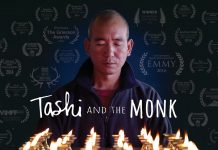The story of Bradley Manning, the forgotten man in the Wikileaks controversy, is one that has all the hallmarks of a spy thriller. Manning was a U.S. soldier serving in Iraq when he allegedly downloaded classified files onto a disk storing Lady Gaga songs. It’s alleged that he then confided what he had done to a computer hacker. A short time later, the authorities arrested Manning, and he has been in a military jail ever since.
Manning is second only to Julian Assange in terms of importance in the Wikileaks controversy. He is alleged to have handed over hundreds of thousands of secret U.S. war files and diplomatic cables. While the world watches Assange’s trial with bated breath, Manning is already wasting away in solitary confinement.
The documentary “The Forgotten Man” tells the story of Manning’s daring intelligence heist. We hear the only recording of Manning’s voice, and we listen to the logs of alleged conversations with the man who ultimately betrayed him. The film paints a picture of a man who, in the face of overwhelming odds, stood up for what he believed in, and paid a heavy price for it.
Manning’s actions have been praised by some as an act of heroism, and condemned by others as an act of treason. Regardless of how one feels about Manning’s actions, it’s clear that he has been treated harshly by the U.S. military justice system. Manning has been held in solitary confinement for extended periods of time, subjected to inhumane treatment, and denied access to proper medical care.
The documentary sheds light on the broader issues surrounding Manning’s case, including the government’s use of classification to hide wrongdoing, and the treatment of whistleblowers in the U.S. legal system. It’s a sobering reminder that in a society that values transparency and accountability, those who speak out against injustice are often punished, while those who commit atrocities are allowed to go free.
One of the most striking aspects of “The Forgotten Man” is the way in which it humanizes Manning. In the media, Manning has often been portrayed as a cold, calculating traitor. But in the documentary, we see a different side of Manning. We see a young man who was struggling with his identity, trying to make sense of his place in the world. We see a man who was deeply troubled by what he saw in Iraq, and who felt a moral obligation to take action.
The film raises important questions about the role of whistleblowers in a democratic society. Whistleblowers play a critical role in exposing corruption and wrongdoing, and yet they are often treated as criminals. As a society, we need to have a serious conversation about how we can better protect those who speak out against injustice.
In conclusion, “The Forgotten Man” is a powerful documentary that tells the story of Bradley Manning’s daring intelligence heist. The film sheds light on the broader issues surrounding Manning’s case, including the government’s use of classification to hide wrongdoing and the treatment of whistleblowers in the U.S. legal system. It’s a sobering reminder of the importance of transparency and accountability in a democratic society, and a call to action for all of us to stand up for what we believe in, even in the face of overwhelming odds.

































